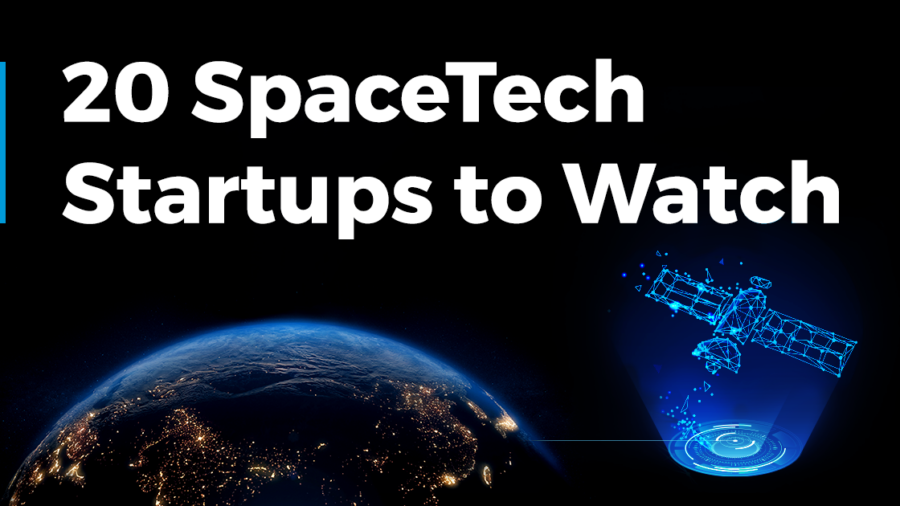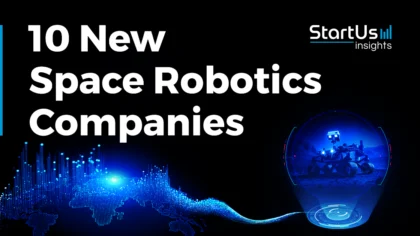The SpaceTech startups highlighted in this report develop novel technology solutions to help reduce the costs and complexities involved in space and space travel. Satellites are equipped with sensors to capture a range of data related to the Earth and space, with increasingly more launches happening to facilitate research & development. Startups also develop propulsion and power supply technologies suitable for space-based operations. Some of the more future-oriented solutions under development include space tourism technologies as well as navigation tools to avoid the large volume of space debris floating in the low earth orbit. Read more to discover the innovative solutions developed by 20 innovative SpaceTech startups that you should watch out for in 2025.
This article was updated in July 2024.
20 SpaceTech Startups to Watch in 2025
- True Anomaly – Autonomous Orbital Vehicle
- REA Space – Bionic Spacesuit
- OrbitAID – Orbital Fuel Stations
- GATE Space – Bolt-on Propulsion & Deep-throttling Engine
- Quindar – Satellite Mission Management
- OhmSpace – Low-pressure Water Propellant
- Apex – Configurable Satellite Buses
- Revolv Space – Solar Array Rotary Actuator
- Metakosmos – Intelligent Spacesuits
- Abyom SpaceTech – Re-ignitable Cryogenic Rocket Engines
- GalaxEye – Multisensor Imaging Satellite
- Ephemersys – CubeSat Mission Analytics
- Vyoma – Collision Avoidance
- Ion-X – Electric Propulsion System
- Quasar – Phased Array Ground Station
- Astrix – Inflatable Solar Arrays
- Outpost – Reusable Satellites
- UNA STELLA – Suborbital Space Travel
- Deep Space Biology – Space Biology Research
- Regolithix – In-Situ Resource Utilization
Global Startup Heat Map highlights 20 SpaceTech Startups to Watch
Through the Big Data & Artificial Intelligence (AI)-powered StartUs Insights Discovery Platform, covering over 4.7M+ startups & scaleups globally, we identified 1544 SpaceTech startups. The Global Startup Heat Map below highlights the 20 SpaceTech startups you should watch in 2025 as well as the geo-distribution of all SpaceTech startups & scaleups we analyzed for this research.
Want to explore all 1500+ startups advancing SpaceTech?
Based on the heat map, we see high startup activity in Europe and the USA, followed by India. These SpaceTech startups work on solutions ranging from satellite mission management and bionic spacesuits to electric propulsion systems and orbital fuel stations.
As the world’s largest resource for data on emerging companies, the SaaS platform enables you to identify relevant technologies and industry trends quickly & exhaustively. Based on the data from the platform, the Top 20 SpaceTech Startup Hubs are in London, New York, Bangalore, San Francisco, and Los Angeles.
The 20 hand-picked startups highlighted in this report are chosen from all over the world and develop solutions such as intelligence spacesuits, orbital fuel stations, cryogenic rocket engines, electric propulsion systems, and much more.
Explore 20 SpaceTech Startups to Watch in 2025
True Anomaly makes an Autonomous Orbital Vehicle

USA-based startup True Anomaly makes an autonomous orbital vehicle, Jackal. It is designed for live and simulated rendezvous and proximity operations. Jackal is able to maneuver in any orbit — LEO, MEO, GEO, or cislunar. Moreover, owing to its multi-modal sensor suite and modular payload configuration, it supports all types of space missions.
True Anomaly also develops a software, Mosaic, to work with Jackal. It uses human-machine teaming to free up operator time by providing mission planning and tactical decision support. Battle Management provides a complete operating picture from multiple angles while Digital Range enables safe testing and training with virtual assets and scenarios. Pilot allows operating live spacecraft with AI assistance, and Services provide shared capabilities like alerts and modeling/simulation resources to power other Mosaic tools.
REA Space designs a Bionic Spacesuit

Italian startup REA Space makes a bionic spacesuit, Electrical Muscle Simulation (EMSi) that interacts with postural muscles and counteracts low gravity effects. To achieve this, REA Space deploys an electrode system combined with tactile and optical sensors and semi-rigid structures applied to technical fabrics.
When worn on Earth, EMSi uses sensors to map movements and analyze them under gravity’s effects. In space, it stimulates the body electrically to stop bone and muscle loss and keep the cardiovascular system functioning.
OrbitAID provides Orbital Fuel Stations

Indian startup OrbitAID manufactures an autonomous docking and refueling interface, Standard Interface for Docking and Refueling Port (S.I.D.R.P). The solution features dual-docking redundancy and is designed to seamlessly integrate with existing satellite connectors.
By establishing an in-space fuel station, OrbitAID enables efficient utilization of spacecraft resources. It refuels satellites to extend their operational lifetime beyond what is currently possible with non-reusable propellant supplies.
GATE Space enables Bolt-on Propulsion & Deep-throttling Engine

GATE Space is an Austrian startup that develops GATE Jetpack, a plug-and-play mobility solution for satellite missions. As a bolt-on propulsion solution that is attached to the satellites’ payload adapter, the GATE Jetpack is compatible with all ESPA-class satellites. It provides mission-lasting mobility as it remains with the satellite permanently. Moreover, it enables satellites to cover the last mile to their final orbit and perform mission reconfiguration, collision avoidance maneuvers, refueling, and de-orbiting.
The startup’s other product, GATE Thruster is a small deep-throttling engine. It is capable of precise continuous deep throttling in a ratio of 1:10 and transient thrust profiles and pulsed operation at 10 Hz. Thus, allowing it to perform like an apogee engine and a reaction control thruster combined. The GATE Thruster enables three-axis stabilized orbit transfers without additional reaction control thrusters by exploiting differential thrust balancing.
Quindar simplifies Satellite Mission Management

USA-based startup Quindar provides a SaaS solution for satellite mission management. The platform facilitates the management of diverse satellites, payloads, and multiple missions. It offers cloud services and partner integrations, focusing on efficient payload operations. Quinder’s automated workflows ensure efficient alert routing and minimal manual intervention.
Key features include spacecraft procedure integration with git, antenna time reservation across GSaaS providers, flight path analysis, and command across various C2 systems. The platform emphasizes scalability, accommodating expanding satellite constellations. Further, users are also able to analyze flight paths and commands across most command and control systems through the platform.
OhmSpace leverages a Low-pressure Water Propellant

OhmSpace is a UK-based startup that specializes in electric propulsion technology. The startup uses metal 3D printing to make its patented ultra-compact electric heater, STAR Water. It employs a low-pressure water propellant that offers a better thrust-to-power ratio than traditional propellants.
This is also a safer and more efficient alternative to chemical propulsion. Additionally, OhmSpace’s multi-propellant, high-thrust electric engine utilizes extra-terrestrial propellant resources, optimizing logistics between celestial bodies.
Apex facilitates Configurable Satellite Buses

USA-based startup Apex offers standardized satellite buses ranging from 100 to 500kg, tailored for specific mission requirements. The startup’s software, Virtual Flatsat, facilitates the emulation of Apex bus configurations, enabling payload testing via Ethernet.
Apex’s Bus Emulator Interface encompasses payload digital interfaces such as Ethernet, RS422, RS485, CAN, and LVDS. This interface also integrates payload power indicators and a flight-light connector interface for data and power. The Mechanical Interface ensures compatibility by validating the mechanical fit to the payload interface plate, incorporating a standardized Apex bolt pattern.
Revolv Space provides a Solar Array Rotary Actuator

Based out of Netherlands, Revolv Space is a startup that provides small satellite components to maximize mission uptime. Their main product is SARA, a solar array rotary actuator for satellites. SARA features automated sun tracking which increases the available power onboard.
It has a fail-safe mechanism to maintain performance in anomalies and significantly increases average power intake. It also offers a plug-and-play, standardized solution with optional solar panels. The system is fault-tolerant by design with a backup mechanism to restore panel position. Additionally, the startup’s dedicated electronics allow autonomous operation independent of the satellite computer.
Metakosmos manufactures Intelligent Spacesuits

Australian startup Metakosmos manufactures intelligent spacesuits, Komosuit, using fabrics resistant to extreme space conditions. The startup employs electro-mechanical systems, biomechanics, and AI in spacesuit development for accurate data collection.
The suits have integrated flexible sensors and micro-electromechanical systems to track biomarkers and regulate temperature for injury protection. Additionally, through Metakosmos’ Kosmosuit Studio, astronauts are able to simulate missions using a digital twin to gain performance insights while wearing a spacesuit.
Abyom SpaceTech offers Re-ignitable Cryogenic Rocket Engines

Abyom SpaceTech is an Indian startup that develops a re-ignitable and throttleable cryogenic engine for rockets and launch vehicles, emphasizing rapid reusability. The startup’s Reusable Sounding Rocket (RSR) facilitates various space experiments and data collection.
The Small Reusable Launch Vehicle (SRLV) is designed for efficient satellite launches into low earth orbits. Finally, the Medium Reusable Launch Vehicle (MRLV) targets diverse satellite launches into multiple orbits.
Interested in exploring all 1500+ SpaceTech startups & scaleups?
GalaxEye builds Multisensor Imaging Satellite

GalaxEye is an Indian startup that develops Drishti, an earth observation satellite equipped with multiple sensors. Drishti features multispectral imager (MSI) and synthetic aperture radar (SAR) sensors in a single platform to enable high-resolution, all-weather imagery.
This multisensor configuration creates a comprehensive earth observation (EO) dataset and satellite sub-daily revisits provide global data coverage. The startup deploys Drishti for proprietary EO missions for mining, insurance, agriculture, maritime, energy, and utility industries among others.
Ephemersys advances CubeSat Mission Analytics

Hungarian startup Ephemersys develops Mission Builder, a software for CubeSat mission analytics. This tool enables space scientists and researchers to examine various scenarios across different orbits, aiding in swift decision-making. Key features of Mission Builder include a CubeSat builder, data and RF-Link analysis, power analysis, radiation analysis, thermal analysis, and lifetime and debris analysis.
The scenario-based analysis tool supports the design of nanosatellite missions by, for instance, calculating the orbital heating environment and performing single-node thermal analyses to maintain the desired temperature range in space.
Vyoma facilitates Collision Avoidance

German startup Vyoma operates satellite constellations for satellite-based active space objects and debris localization and facilitates collision avoidance. Its machine learning (ML) platform lists and visualizes conjunction data messages (CDMs) gathered from third-party and own systems onboard its satellite constellations.
It provides spacecraft operators with information on their space assets and conjunction assessments by tracking space objects and debris. This way it predicts collision probabilities, suggests optimal maneuvers, and expedites operator ephemeride validations for real-time mapping and spacecraft collision avoidance.
Ion-X builds an Electric Propulsion System

French startup Ion-X builds plug-and-play electric propulsion systems of small form factor for small satellites (smallsats). HALO-100X, the startup’s patented thruster is based on electrohydrodynamics (EHD) technology and comprises a propulsive slab, fuel tank, and power processing unit.
It features an in-flight configurable thrust-to-specific impulse (ISP) ratio, and offers higher modularity, vectoring capabilities, and mission-specific customization. On commercialization, low earth orbit (LEO) EO and telecommunications smallsat clusters use it as an efficient, chemical hazard-free, and affordable thruster.
Quasar provides a Phased Array Ground Station

Australian startup Quasar develops a digital multibeam phased array ground station as a service (GSaaS) for space communications and command. Its multi-beam phased array antenna operates at cryogenic temperatures and provides higher sensitivity and broad frequency processing.
It is software-defined and enables simultaneous multiple satellite communications and interoperability with existing channel partners and ground stations. Satellite operators use its space data as a service platform to lower the costs of satellite-to-ground station communication and satellite data acquisition.
Astrix develops Inflatable Solar Arrays

New Zealand-based startup Astrix designs Copia, an inflatable and rigidizing solar array. Copia allows higher packing density in spacecraft compared to foldable solar arrays with hinges. This increases the deployable surface area of solar cells at lower mass and, therefore, increases the power density of the arrays.
Further, Astrix offers array customization using either a triple junction or silicon solar cells as per the mission performance requirements. Satellite manufacturers use it to increase power generation using a single structure at a reduced cost and payload weight.
Outpost makes Reusable Satellites

US-based startup Outpost enables satellite reuse using advanced earth return methods. The startup’s reusable satellite Ferry leverages a two-stage re-entry method for low-mass, high-efficiency earth return.
It uses autonomous paraglider technology to ensure a precision landing on earth and full satellite and payload recovery for further research. These reusable satellites are launch vehicles agnostic, eliminate new satellite development costs and advance sustainability initiatives in space.
UNA STELLA enables Suborbital Space Travel

South Korean startup UNA STELLA develops manned space launch vehicles to provide suborbital space travel services. The startup’s launch vehicle USB Bravo proposes vertical take-off with eight passengers and offers a zero gravity experience on reaching the apogee.
Its booster stage and cabin capsule are both reusable and land at the desired location. The startup provides space travel, space transportation, and taxi services.
Deep Space Biology supports Space Biology Research

US-based startup Deep Space Biology provides Yotta, an AI-powered platform to expedite space biotechnology research. Yotta features a bio-knowledge engine that uses machine learning to analyze, organize, and manage data on biological relationships, broad-spectrum data, and complicated studies.
Its predictive algorithms equip researchers with tools to formulate data-driven hypotheses. It also accelerates discovery and research in space biology by providing investors with research impact assessments to make impact investments.
Regolithix enables In-Situ Resource Utilization (ISRU)

Regolithix is a UK-based startup that proposes in-situ resource utilization (ISRU) of lunar and martian resources. It develops regolith processing technology to research, design, and manufacture bespoke components for space missions using lunar regolith.
These space components reduce the usage of non-reusable space hardware and save the Earth’s resources. It aims to create an in-orbit service economy by supplying lunar resources for in-orbit manufacturing, refueling, and habitation.
Discover All Emerging SpaceTech Startups
The SpaceTech startups showcased in this report are only a small sample of all startups we identified through our data-driven startup scouting approach. Download our free SpaceTech Innovation Report for a broad overview of the industry or get in touch for quick & exhaustive research on the latest technologies & emerging solutions that will impact your company in 2025!








